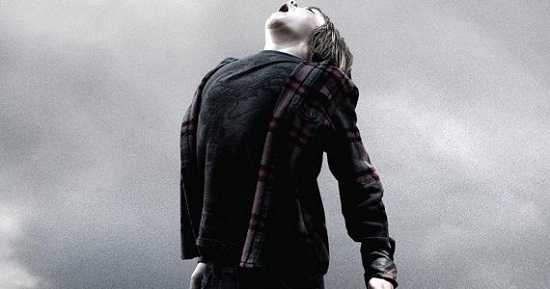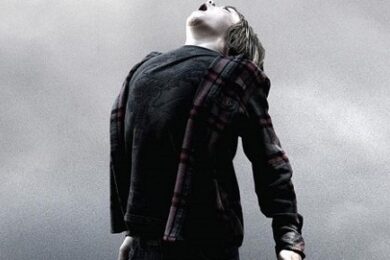One thing any good horror film should do is tap into the atavistic terror people can experience even when, rationally, there’s no reason to. There’s a particular strand of modern horror that aims to do this by concentrating on the domestic: taking comfortable, suburban family life and infiltrating it slowly with the creeping threat of the supernatural. Scott Stewart’s Dark Skies is the latest in this genre, a film which creates its impact not by throwing buckets of gore at the screen, but psychologically, by simply asking you to imagine feeling unsafe in your own home.
Dark Skies is the newest release from Blumhouse Productions, following hits including the Paranormal Activity series, Insidious and Sinister. They share common threads: themes of domestic disturbance in a contemporary, suburban settings and a gradual supernatural invasion threatening a nuclear family. These films don’t expect you to empathise with people being tortured and ripped apart in some epic, baroque feud conducted by shrieking fiends from hell. They just want you to think about what you’d do if you didn’t believe your children were protected. They’re formulaic – extremely so – and this is their weakness and their strength. The predictability of the way they create unease then exploit it with well-timed frights creates a paradox: they’re scary, but in a comforting way. Audiences are attuned to the visual and auditory cues that a fright is coming, and the adrenaline rush of these safe shocks is addictive, like a rollercoaster ride, and just as short-lived.
Dark Skies’ plot is absolutely standard. Apart from their origin story, its grey aliens are indistinguishable from the demons and ghosts of Paranormal Activity, Insidious and other recent releases like Mama, The Pact and The Possession. The families, the children, the houses, the artefacts, the web research and the crazy expert are always as reassuringly familiar as the sudden jumps and starts and supernatural reveals.
Films of this genre are so similar that the hooks to keep you watching have to be in the details. The secret that these successful producers have realised, though, is that these hooks shouldn’t lie in the nature of the supernatural entity, or even what it does to the family, they should be in the problems the family has before they even know they’re being haunted, and how these issues affect their reactions. As Tolstoy suggested, interesting stories about families depend on there being particular conflicts and dissatisfaction within them.
Daniel, the father in Dark Skies (Josh Hamilton) is consumed with the need to keep up appearances, even though he’s been made redundant and is facing losing his lovely house. For him, being the target of predatory aliens is almost less awful than having the neighbours find out about it. The divisions caused by these worldly stresses are what bring the supernatural threats to life; they inform the families’ individual responses and make us care about them. The human consequences, the effects on relationships, are where the impact lies.
Symbolic links between concepts of home and family are vital, and traditional ideas about the supernatural come into play here – for example, the notion that a tragic or violent event can leave bad energy haunting a house and therefore a family, or tales of demons that attach themselves to families and are passed on through the generations. Houses suffer physical attack, mirroring the emotional attacks their occupants experience, and families’ relationships with their environments deteriorate as their relationships with each other are strained. Dark Skies replaces earthly phenomena with extraterrestrial, but in every other respect the aliens have the exact same effect.
This kind of horror relies on beautiful houses; plenty of panelled doors for evil to hide behind and dark corridors for it to creep along. The polished wooden floors, sombre corridors lined with tasteful artwork, gleaming kitchens and sweeping staircases represent the sanctity of what’s being violated: the institution of the family itself. Children are vital, too. Traditionally sensitive to phenomena adults find hard to accept, little children are innocent and vulnerable, and teenagers are a perfect symbol for the liminal, for creatures on the cusp between one plane of existence and another. Dark Skies’ two boys are perfect stereotypes in this regard.
Like any fiction, Dark Skies and its ilk try to make it easy for audiences to suspend disbelief and invest in the fantasy they create. The fear of losing control over what goes on in your own home – the one place you’re supposed to be able to feel totally secure – conjures up a potent fantasy. If home isn’t safe, where else can you go? What if you were under attack from something supernatural, something that by definition doesn’t follow the rules? What resources would you find within yourself? What could you endure if you absolutely had to?
The power of these fears lies in the extent of the threat. Supernatural horrors start by invading a home and endangering the family within, but the next step is taking over a body and devouring the very soul. Bodily autonomy, the most fundamental security, is ultimately at stake. These themes are rich with possibility. The ways to spark these particular fears are infinitely variable, from the subtle to the gross to the bizarre, and this is why filmmakers continue to exploit them. This and the fact that audiences keep coming back for more.
Dark Skies is well crafted, with decent acting and some genuinely funny moments undercutting the predictable thrills, but ultimately all it is is another identikit thriller in a very familiar mould. It also shares the problem of so many films of this type: that of achieving a satisfactory resolution. Addicts will find it an adequate fix, but the next big fright had better come along soon.



